Biology Alumni
The Elon University Department of Biology takes pride in its alumni.
We believe the paths taken after graduating from this great university deserve attention, and we want to commend our former students for pursuing their rigorous goals and dreams. Elon biology alumni excel in a range of careers, including as medical physicians and healthcare professionals, psychologists, marine biologists, criminologists, and in a host of other fields. This page celebrates the variety of their accomplishments and outcomes.
Alumni profiles
Jordan Claytor '17
 Jordan Claytor graduated with a B.S. in Biology from Elon University in 2017 and is pursuing a Ph.D at the University of Washington. Claytor is completing a dissertation and investigating the ecologies of early mammals following the K-Pg mass extinction (the event that killed the dinosaurs).
Jordan Claytor graduated with a B.S. in Biology from Elon University in 2017 and is pursuing a Ph.D at the University of Washington. Claytor is completing a dissertation and investigating the ecologies of early mammals following the K-Pg mass extinction (the event that killed the dinosaurs).
“Biology piqued my interest at a young age and has stuck with me ever since. Paleontology, or the study of extinct organisms, really resonated with me. I remember watching countless nature documentaries on prehistoric animals and being fascinated with how much we can learn from fossils.”
This passion has driven him to great lengths. He was president of the Biology Club (2016-2017) and a member of the Tri-Beta Honors Fraternity. He received the Biology Department Outstanding Student of the Year award — an honor he remains incredibly proud of because recipients are selected by the faculty.
Since starting at the University of Washington, Claytor has received numerous awards for his research including the National Science Foundation Graduate Research Fellowship and over $5,000 in other research grants. He has visited Elon several times since graduation, when he led several guest lectures for Dr. Gammon and Dr. Kingston. Claytor is especially grateful to Dr. Kathy Gallucci for taking him under her wing and introducing him to the world of teaching. “Through these experiences, I discovered my passion for teaching and science communication which I’ve been able to further develop during my Ph.D program.”
Claytor engaged in Elon’s study abroad program in Perth, Australia, during the spring semester of his sophomore year. While abroad, he worked with a graduate student on their dissertation project and gained firsthand experience with research skills, such as data collection and analysis. “This was a formative experience that influenced my decision to conduct my own research and pursue a Ph.D.”
After earning his doctorate, he plans to work in education or science communication to increase access to the sciences. Read more about Claytor’s research.
Nicole C. Wright '03
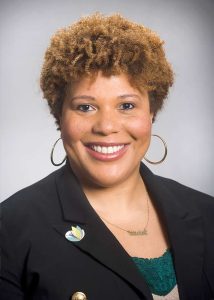 Dr. Nicole Charmaine Wright graduated with a B.S. in Biology in 2003. She went on to earn her Master of Public Healht and Ph.D. from the University of Arizona in 2005 and 2010.
Dr. Nicole Charmaine Wright graduated with a B.S. in Biology in 2003. She went on to earn her Master of Public Healht and Ph.D. from the University of Arizona in 2005 and 2010.
While at Elon, Wright worked with Dr. Linda Niedziela on developing a system to uniformly hatch brine shrimp, as well as some basic toxicology research. She presented her work at Elon’s SURF Day (Spring Undergraduate Research Forum) and the Association of Southeastern Biologist meetings. Wright says that the one-on-one interaction she had with faculty made a lasting impact on her life. She now uses those meaningful interactions as a blueprint for her teaching at the University of Alabama at Birmingham. “I try to give my students the same kind of time and connection that all of the biology professors gave to me.”
Wright identifies her place in the field of epidemiology as a musculoskeletal aging epidemiologist. She focuses on osteoporosis epidemiology and racial disparities in osteoporosis management and outcomes. “[That] is a lot of words to say bone health matters. Your skin may be the largest organ, your brain and your heart may be vital, but the bones are the glue. Not only with the actual physical ability to keep your body upright, but the skeleton also provides protection for your vital organs and nutrients to keep cells running. If calcium is lacking in your diet … your body will take it from your bones to ensure normal cell function, leading to bone weakness and eventually osteoporosis.” Wright specifically focuses on how regulation of other systems in your body — particularly when health conditions lead to irregularities in those systems — alter bone health.
Her passion is rooted in her family. Almost every adult in her family has had a knee replacement, she has had hip surgery, and her brother had a corrective brace for scoliosis. Watching her grandmother shrink away over the years due to osteoporosis, Wright understood that was not a part of normal aging, and it inspired her to look into the racial disparities element of her research. She acknowledges that more research is needed around bone health in communities of color, particularly Black women. “I knew I was not the only Black person with a grandma with osteoporosis, so I wanted to do what I could to add to the field.” Wright conducted research specifically on the racial disparities that exist in Outcomes After Major Fragility Fractures. The number of non-Hispanic Black women with osteoporosis is low; however, older studies have shown that those who sustain fractures have worse outcomes than non-Hispanic White women. Given that 25% of women with a hip fracture die within one year of that injury, increased mortality rates in other fracture types, and the high rates of disability following fractures, worse outcomes in people of color — despite the low number — could lead to an increased burden on the health care system.
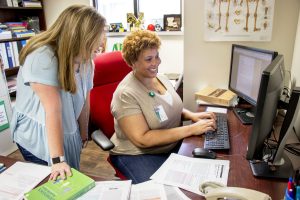 Her team used national Medicare data to identify non-Hispanic Black (n = 11,168) and White (n = 387,832) women with fractures, and then evaluated three important outcomes (death, debility [nursing home stay], and destitution [becoming Medicaid dependent]) in six of the major fragility fractures (hip, femur, pelvis, radius/ulna, humerus, and clinical spine). They found that non-Hispanic Black women had ~25% higher one-year mortality following all fractures with the exception of clinical spine than the one-year mortality rate of non-Hispanic White women. Non-Hispanic Black women also had about ~25% higher rate of one-year long-term nursing home stay for femur, hip, and humerus fractures than the rates of non-Hispanic White women. Lastly, non-Hispanic Black women had ~2.5-fold (100-150%) higher rates of becoming Medicaid dependent following fractures compared to the rates of non-Hispanic White women.
Her team used national Medicare data to identify non-Hispanic Black (n = 11,168) and White (n = 387,832) women with fractures, and then evaluated three important outcomes (death, debility [nursing home stay], and destitution [becoming Medicaid dependent]) in six of the major fragility fractures (hip, femur, pelvis, radius/ulna, humerus, and clinical spine). They found that non-Hispanic Black women had ~25% higher one-year mortality following all fractures with the exception of clinical spine than the one-year mortality rate of non-Hispanic White women. Non-Hispanic Black women also had about ~25% higher rate of one-year long-term nursing home stay for femur, hip, and humerus fractures than the rates of non-Hispanic White women. Lastly, non-Hispanic Black women had ~2.5-fold (100-150%) higher rates of becoming Medicaid dependent following fractures compared to the rates of non-Hispanic White women.
These data not only provide contemporary data on racial disparities in post-fracture outcomes, but she hopes can be used to allocate resources to ensure fracture patients receive appropriate care. Having this foundational information on bone health in communities of color, she says her research is bringing awareness to bone health “in these communities’ providers, advocacy groups, quality metric organizations, and hopefully policy makers.”
Wright’s research and advocacy, as well as her long list of accomplishments, makes the Elon community proud to call her an alumna. Read more about her research.
Matt Sears '18
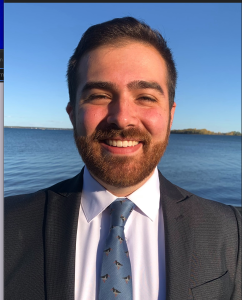 Matt Sears has been on a road to success ever since he stepped foot at Elon and later graduated in May 2018.
Matt Sears has been on a road to success ever since he stepped foot at Elon and later graduated in May 2018.
Sears is employed by Beam Therapeutics as an industry researcher. Beam Therapeutics’ mission is to create lifelong cures for patients suffering from serious genetic diseases through gene-based editing. Industry research “is often the avenue that results in products and medicines that most directly benefit the general population,” Sears said.
Prior to industry research, Sears was a lab manager and research specialist for a molecular genetics lab at UPenn where they investigated RNA-binding protein that was key to normal mammalian development. He and his team utilized a wide array of techniques in their research: molecular protocols, tissue culture, bacterial work, rodent studies, among others. At MIT, he was a research technician for two labs: a neurodegeneration/Alzheimer’s lab and a synthetic neurobiology lab.
At Elon, Sears was an Elon College Fellow and is proudest of publishing the results of a two-year research project on the mating behavior of the squash bug, a common agricultural pest. “The research and its results produced interesting insights into their mating system, as well identified an intriguing and ‘easily’ interrogable instance of evolutionary conflict between sexes.” By the time Sears graduated, he and his research team had all experiments complete and data mostly analyzed. They ran an initial manuscript by an expert in the field and completed the suggested revisions over nearly two years after graduation to be able to publish. That process took him through the steps of exploratory research, from formulating an idea/hypothesis via literature synthesis, to designing and executing numerous experiments, and finally to data analysis, presentation and publication.
Sears says Elon’s educational opportunities and emphasis on undergraduate research primed him for success in his career. “One of the main reasons I chose to go to Elon was the knowledge, funding and opportunities that are inherent to the Elon College Fellows program result in an awesome educational experience. It led me to having a fantastic mentor, formulating my own independent research, presenting my research to a regional conference, and publishing a first-authored publication.”
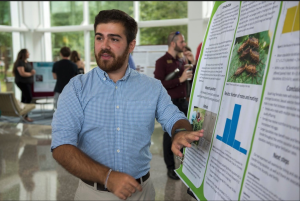 Thankful for the many biology professor he studied under, Sears is especially grateful to his mentor, Associate Professor Jen Hamel. “She was an excellent mentor and teacher, and she provided me with an extremely solid foundation for scientific research to further build upon. She continually pushed me to succeed outside of my academic comfort zone and seize opportunities that I normally wouldn’t have pursued, and I’m super grateful for that!” Together, they completed field research on Barro Colorado Island in Panama. “It was an unforgettable experience,” he said. “It’s not often you are presented with the opportunity to do field work at a beautiful field station surrounded by scientists from all around the world. It wasn’t a walk in the park or your typical time spent abroad during college, but it isn’t an experience I’d trade for anything!”
Thankful for the many biology professor he studied under, Sears is especially grateful to his mentor, Associate Professor Jen Hamel. “She was an excellent mentor and teacher, and she provided me with an extremely solid foundation for scientific research to further build upon. She continually pushed me to succeed outside of my academic comfort zone and seize opportunities that I normally wouldn’t have pursued, and I’m super grateful for that!” Together, they completed field research on Barro Colorado Island in Panama. “It was an unforgettable experience,” he said. “It’s not often you are presented with the opportunity to do field work at a beautiful field station surrounded by scientists from all around the world. It wasn’t a walk in the park or your typical time spent abroad during college, but it isn’t an experience I’d trade for anything!”
Sears remains passionately curious about science and how biological life came into existence. “Life is a nearly unbelievable cosmic happenstance that emerged out of a seemingly random and entropic universe. Chemistry, physics, mathematics, geology, even astronomy — all these fields provide insight into the understanding, natural history and mechanisms of biology. It is this grand culmination of the laws of the universe, and we get to study it!”
Elisson Adrien '17
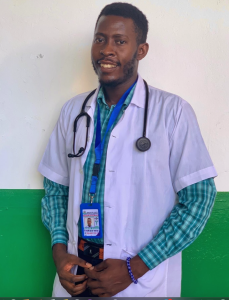 Elisson Adrien graduated from Elon University in 2017 and and is pursuing a doctor of medicine from the School of Health Sciences at Quisqueya University in his native Haiti.
Elisson Adrien graduated from Elon University in 2017 and and is pursuing a doctor of medicine from the School of Health Sciences at Quisqueya University in his native Haiti.
Adrien was born and raised in Layaye — a village about 18 km from Hinche, the main city of the Central Plateau region of Haiti. From a very young age, he wanted to study medicine. When he was accepted to Elon University, he knew that he wanted to major in biology to follow his dream.
But how did a boy from a village in Haiti end up at this mid-sized private university in central North Carolina? “My story is one that I am very proud of because it shows how good things can come within the connections between Haitians and Americans.” In 2004, the Cathedral of Immaculate Conception of Memphis, Tennessee (IC Haiti Ministry) partnered with his parish as part of the Parish Twinning Program of the Americas. Led by Dr. Debra Bartelli, IC Haiti Ministry provided financial support for economic development of Adrien’s home village of Layaye. Before travel restrictions, the ministry visited his village twice a year. In 2007, John Ryan McGreevy ’10 — then a first-year student at Elon University, and Bartelli’s nephew — asked to accompany her to Haiti after reading “Mountains Beyond Mountains,” the common reading for incoming students that fall. McGreevy and Adrien met briefly, but Adrien wasn’t yet fluent in English. Three years later, their paths crossed again in winter term 2010 when McGreevy returned to Haiti to research solar cooking. Adrien was a high school senior and knew enough English to work with him as a translator and research guide. Walking the dirt paths in the rural Layaye, they conversed about their passions and future plans. “I told him about my dream of becoming a medical doctor. At that time that was fantasy because it was a long shot for a young Haitian orphan who could not even afford to eat every day.”
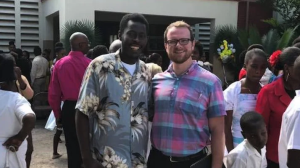 On Jan. 12, 2010, a deadly earthquake hit Port-au-Prince, destroying much of the city, including universities Adrien had planned to apply to. McGreevy suggested Adrien consider U.S. universities. “He told me how medical schools work in the U.S. and that, though Elon did not have a medical school, I could study pre-med there.” Before McGreevy left, he promised Adrien he would be his fiercest advocate to help him get to Elon. In 2011, Adrien applied to Elon. Dr. Robert Lorsbach, a missionary in Arkansas, welcomed Adrien to live with his family for eight months for support in learning English in preparation for the Test of English as a Foreign Language.
On Jan. 12, 2010, a deadly earthquake hit Port-au-Prince, destroying much of the city, including universities Adrien had planned to apply to. McGreevy suggested Adrien consider U.S. universities. “He told me how medical schools work in the U.S. and that, though Elon did not have a medical school, I could study pre-med there.” Before McGreevy left, he promised Adrien he would be his fiercest advocate to help him get to Elon. In 2011, Adrien applied to Elon. Dr. Robert Lorsbach, a missionary in Arkansas, welcomed Adrien to live with his family for eight months for support in learning English in preparation for the Test of English as a Foreign Language.
Adrien was motivated to become a healthcare worker for his community. His mother died in 2008 from an undiagnosed condition. He wanted to provide care to and save others. “I know she would be very proud to see the man I have become.”
While at Elon, Adrien participated in various service trips, including disaster relief in Long Island, N.Y., hunger and homelessness in Washington, D.C., and in Mustard Seed Community in Jamaica. “It meant a lot to me because I was always wanting to help others in any capacity I could. I see it as a way to give back a little of the many blessings that I have received over the years. That spirit continues with me till this day and has led to my dedication of doing something for others.”
Adrien also pursued many academic opportunities, including researching medicinal uses of plants in rural Haiti during winter term of his junior year and an internship at Anne Arundel Medical Center (AAMC) in Annapolis, Maryland. “It was very fascinating to learn what plant they used and how the knowledge is transferred from generation to generation, but also how, for most of them, that was their only access to medical care when they are sick — either because they live in remote places, or they do not have the funds necessary to spend for healthcare.” At AAMC, he studied the effect of patient portal use on patients’ health. The experience fueled his ambitions to become a doctor.
Adrien said Spanish professor April Post made a significant impact on his life at and since Elon. “Her way of teaching and her understanding of students from different backgrounds was amazing.” Her support continued after graduation as he pursued medical degrees. “If I ever become a professor, I would want to use her as my model to connect with my students.”
Post-graduation, Adrien returned to Haiti to attend medical school, where he led mobile medical clinics for people in Layaye and other remote areas. “I have learned how difficult it is to do so because it is very costly with getting medications for the people. The needs are great, the willingness is there, but the means to do it effectively is not yet there. While I am nearing the end of medical school, I hope I will be able to find some generous friends who are able to support my goals and help me reach more people with medical needs.”
Adrien has since collaborated with McGreevy in research for his doctoral dissertation. Their work looks at compound disasters and their effects on livelihoods and people’s abilities to recover. They hope to publish their results and shed more light on the resilience of the Haitian people. Adrien also had the chance to assist Multifaith Scholar Katie Hooker ’20 during her research of how Haitian migrants practice their faiths and how they are perceived in the United States, particularly in Miami.
Entering the healthcare system will give Adrien the opportunity to bring the most needed healthcare to the people in one of the most rural parts of the country. He wants to be a liaison to his community and the outside world. His goal one day is to construct or lead the construction of a full-service hospital to serve the people in the region that could also become a base for public health outreach and public health education for the surrounding areas.
Podcasts
Episodes of “Where They Are Now And Where We Will Follow,” a podcast featuring discussions with biology alumni about their career paths and life after Elon.
Episode 1: Pythons and Post-Grad with Ian Easterling '14
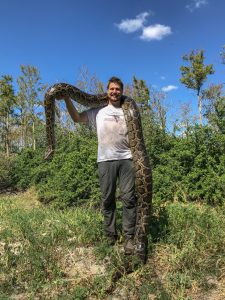 This premiere episode is an interview with 2014 graduate Ian Easterling. Ian and his research team use radiotelemetry to track pythons and extract them from the earth. Ian talks about how he landed this career, gives advice on internships, and offers a helpful outlook on a scientific career with no graduate school involved.
This premiere episode is an interview with 2014 graduate Ian Easterling. Ian and his research team use radiotelemetry to track pythons and extract them from the earth. Ian talks about how he landed this career, gives advice on internships, and offers a helpful outlook on a scientific career with no graduate school involved.
Episode 2: Scientific Methods And More with Haley Shust)
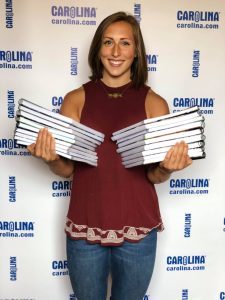 Haley Shust ’15 discusses the world of science education, the importance of networking, benefits of scientific literacy, and how she applies her biology degree to her career in a non-scientific field.
Haley Shust ’15 discusses the world of science education, the importance of networking, benefits of scientific literacy, and how she applies her biology degree to her career in a non-scientific field.
Episode 3: Haiti and Heat with Elisson Adrien '17 and John McGreevy '10
Follow two Elon alumni, Elisson Adrien ’17 and John McGreevy ’10, as they discuss their journeys from Haiti to the US and vice versa. Both have completed research pertaining to the environment, natural disasters and global warming. They talk about the intersection of science and religion, and offer sound advice for young minds carving out their career paths.
Adrien is working toward becoming a medical doctor. McGreevy works within the U.S. National Parks Service. If you have an interest in the medical or environmental science fields this episode is for you.
Reporting and podcasts by Frieda Walsh-Seaman ’24.